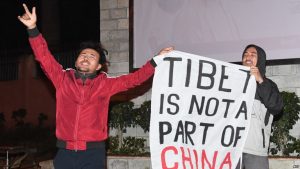
SFT Protest
Nine Tibetans were arrested on December 11 after protesting outside The Imperial Hotel in Delhi, where a Chinese delegation to India is currently staying. The party includes China’s Foreign Minister Wang Yi, and marks the first political interaction between the two countries in several months. The relationship between India and China became fraught in June following a border row, but Yi’s arrival — here to take part in the Russia-India-China trilateral dialogue — suggests an end to tensions.
While this may be good news for some, his visit stirred up animosity among Tibetans across India. Students for a Free Tibet kicked off their protest by displaying a large banner over a flyover near Indira Gandhi International Airport. It read: “Wng Yi, Free Tibet Now.” The nine detainees, also members of the youth group, were arrested later that day for carrying banners reading: “Tibet in not a part of China,” and “China free Tibet now.”
The Tibetan Youth Congress, too, spoke out against the visit, saying that Yi represents a “regime that today rules China out of sheer military might without public mandate, unleashing a reign of terror, denying freedom and human rights to its people, leading to unparalleled genocide of over 70 million Chinese including 1.2 million Tibetans.”
The organisation did, however, acknowledge that improved Sino-India relations are key if progress on the Tibet issue is to be made — progress that is more and more in India’s interest. The Russia, India, China meeting comes on the back of China’s decision to build a 1,000km tunnel for the Brahmaputra, which, when completed, will be the world’s longest by a huge margin.
It will be used to divert the waters of the Brahmaputra river – the Tsangpo in Tibet – to the dry Xinjiang region of north west China, and “is a major threat to India and other downstream countries whose survival depends on Tibet’s rivers,” according to Tenzin Tselha, National Director of Students for a Free Tibet.
“Tibet’s Independence is vital for India’s security,” said Michael Rajchandra, a member of Students for a Free Tibet. “As an Indian member of Students for a Free Tibet, I urge Sushma Swaraj, foreign minister of India to stand up for Tibet’s Independence.”
The nine members of Students for a Free Tibet were later released without charge, although if this is the beginning of close workings between India and China, there is speculation that there will be many more such demonstrations in the near future.




 Print
Print Email
Email